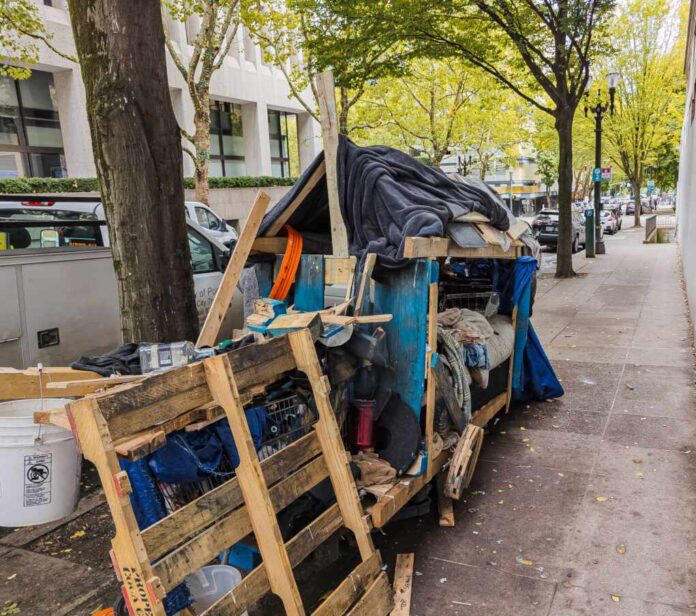
Some of Portland’s growing homeless population has taken to constructing “tiny homes” on the city streets, fashioning them from materials like wood and plywood to create ramshackle structures as their shelter. The development underlines the deepening crisis in a city struggling with rampant homelessness, exacerbated by open-air drug use and a climbing crime rate.
Resident Kevin Dahlgren, who has gained recognition for chronicling Portland’s homeless situation, recently shared videos showcasing the wooden structures. Dahlgren has published photos and accounts of the makeshift homes on his account on X, formerly known as Twitter. He has shown how many of the shelters have been marred by drug use and illegal activities.
I’m finding tiny homes built by the homeless popping up on nearly every block in some neighborhoods. This one is quite nice and even has a basketball hoop. Another was I saw today though was used for prostitution and another for drugs. pic.twitter.com/NBJp4F4JV8
— Kevin Dahlgren 🥾 🥾 (@kevinvdahlgren) March 21, 2024
Amid the crisis, Portland, governed by Democrat leadership, has seen its downtown areas emptied as residents flee the rampant open-air drug activities and potential crime. Former Mayor Ted Wheeler labeled the situation a “humanitarian catastrophe.”
Portland vagrants construct "tiny homes" on city streets as homeless crisis worsenshttps://t.co/TuxSOfW637
— The Post Millennial (@TPostMillennial) March 22, 2024
Despite an investment exceeding $1 billion to alleviate homelessness, tangible results remain elusive, sparking public debate and scrutiny over the management and utilization of these funds. Residents have taken to social media to question why homeless individuals can erect structures without permits while strict regulations and fees bind homeowners.
A recent DHM Research poll revealed that homelessness remains a paramount concern among Portland residents, paralleled by issues related to drug use and addiction. As the leftist city government continues to facilitate and enable illegal activity and drug use, the problems plaguing the city are sure only to get worse. Portland officials would be well advised to consider one of the basic economic laws of public policy: Whatever you subsidize, you will get more of.
The “tiny homes” phenomenon in Portland sharply illustrates the complexities and depth of the homelessness issue — a manifestation of systemic failures at multiple levels of governance and public policy. Despite significant financial allocations, the city’s struggles underscore a misalignment between resource distribution and effective, impactful solutions.



























